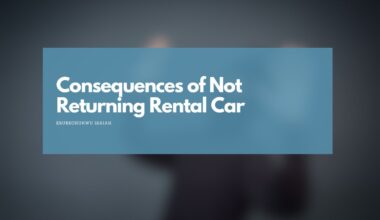As an Amazon Associate, I earn a small commission from qualifying purchases. Learn more about this.
Renting a car should ideally be a straightforward experience, but anyone who’s done it knows that the final bill can sometimes be shocking.
Hidden among various taxes and surcharges, pretty much like most fees, comes the Energy Recovery Fee (ERF).
If you’re budget-conscious and want to understand how this fee impacts your overall spending—and how you can mitigate it—read on.
What is the Energy Recovery Fee (ERF)?
The Energy Recovery Fee (ERF) might just seem like another line item on your Avis rental car bill, but understanding it can make a significant difference, especially if you rent cars frequently or are managing a budget during your travels.

Simply put, the ERF is a fee charged by rental car companies like Avis to help offset the costs associated with the purchase, maintenance, and disposal of items that relate to a company’s energy usage.
Now, should this fee even be your responsibility?
Fair question. Rental car companies have various operational costs, including energy costs to power their facilities, fuel for shuttle services, and even the energy consumed by the cars themselves before they are rented.
While you’d expect most of these costs to be bundled into the rental price, some are broken down as separate fees. This is often done for transparency, compliance with local regulations, or to reflect fluctuations in costs like energy prices.
In many cases, these fees are in place to offset the increasing costs of energy, which can fluctuate due to a range of factors including geopolitical tensions, natural disasters, and changes in regulation.
These fluctuations are unpredictable and can significantly impact a company’s bottom line. By implementing an Energy Recovery Fee, Avis and other rental companies aim to stabilize their operational costs.
Now, how much does the ERF typically cost?
Let’s talk about it in the next section.
How Much Does ERF Cost?
The actual cost of ERF varies widely by rental company and location.
Generally, you can expect it to be a relatively small, flat daily fee.
To give a ballpark figure (and remember, this is just an estimate), the ERF could range anywhere from $0.50 to $2.50 per day of rental. This fee is aside from the rental cost, taxes, and other fees that are levied by the rental company.
For instance, this is a snapshot of a bill from Avis…

And here’s another one…

Almost a $2 difference!
Some factors affecting the ERF cost include the geographical area and the specific rental company’s policies. If you’re renting a car in a major city or an area with higher living costs, the ERF may be on the higher end of the scale.
Similarly, each rental company sets its own fees, and these can change without notice. For example, Avis may charge a different ERF than Budget, even for similar vehicle types and rental durations.
It’s important to note that the ERF is not a government-mandated fee, but rather a charge set by the rental car company itself.
This means that it’s not subject to the same kind of regulation as taxes or other official fees, giving companies the flexibility to adjust it as they see fit. Because of this, the ERF may also change based on the season or demand, with higher fees possible during peak travel times.
How do you find out the exact ERF before you book?
The most reliable way is to check the breakdown of fees on the rental company’s website when making your reservation.
If the ERF is not clearly listed, don’t hesitate to contact customer service for clarification. It’s always better to have all the information upfront than to be surprised by an additional fee when you get the final bill.
How to Mitigate ERF Charges Avis, Budget, and Other Companies
1. Research Before Renting:
Before you decide to rent a car, it’s always a smart move to do a thorough comparison of prices across various rental agencies.
While you might find one company offering a lower daily rate, their total might be higher when adding the ERF and other fees. Don’t just stop at the base price. Ask the rental company for a complete breakdown of all charges.
2. Location Matters:
If you’ve rented cars from the same company in different states or cities, you might have noticed that the ERF can vary.
This is due to regional energy costs and policies. Consider renting from a location that might be a little further away from major tourist spots or airports, as these locations might have lower overheads and, consequently, lower ERF charges.
3. Use Third-party Platforms:
Websites and apps that aggregate rental car options can sometimes offer deals that include a reduction in fees.
While these platforms typically focus on giving you a cheaper base price, the bundled deals might indirectly help in reducing the impact of the ERF
4. Loyalty Programs and Memberships:
Enrolling in a rental car company’s loyalty program can sometimes offer perks that include reduced fees or the waiving of certain charges, including the ERF.
If you’re a frequent renter, it might be worth checking out what Avis Preferred, Budget Fastbreak, or other loyalty programs from various rental companies offer.
Conclusion
By being proactive and doing a bit of homework, you can significantly impact the amount you end up paying in Energy Recovery Fees.
We’re all looking for ways to save, especially when it comes to hidden or additional costs that aren’t immediately obvious. Use these tips as a guideline the next time you find yourself in need of a rental car, and drive away knowing you got the best deal possible.







